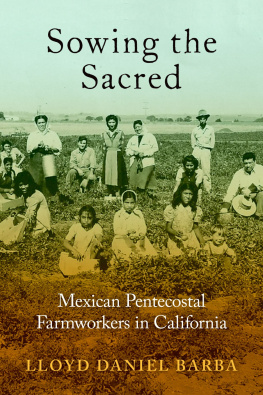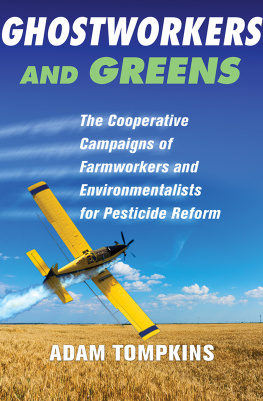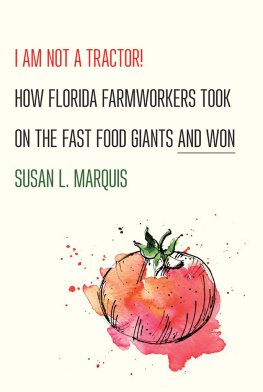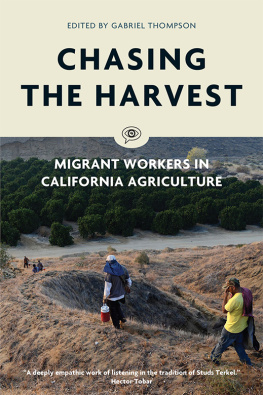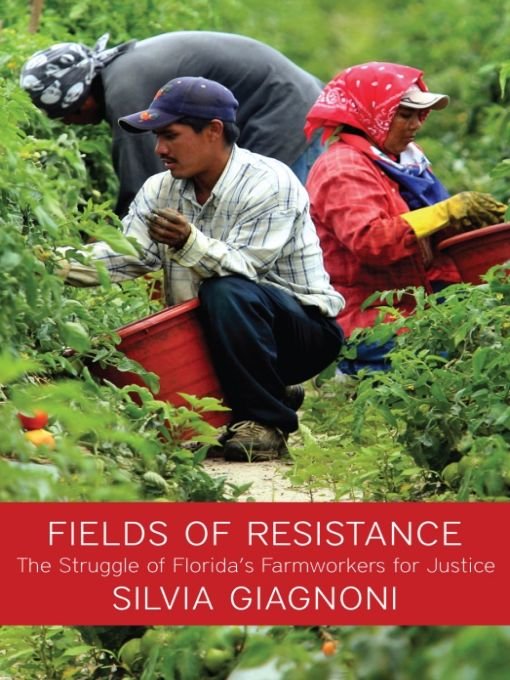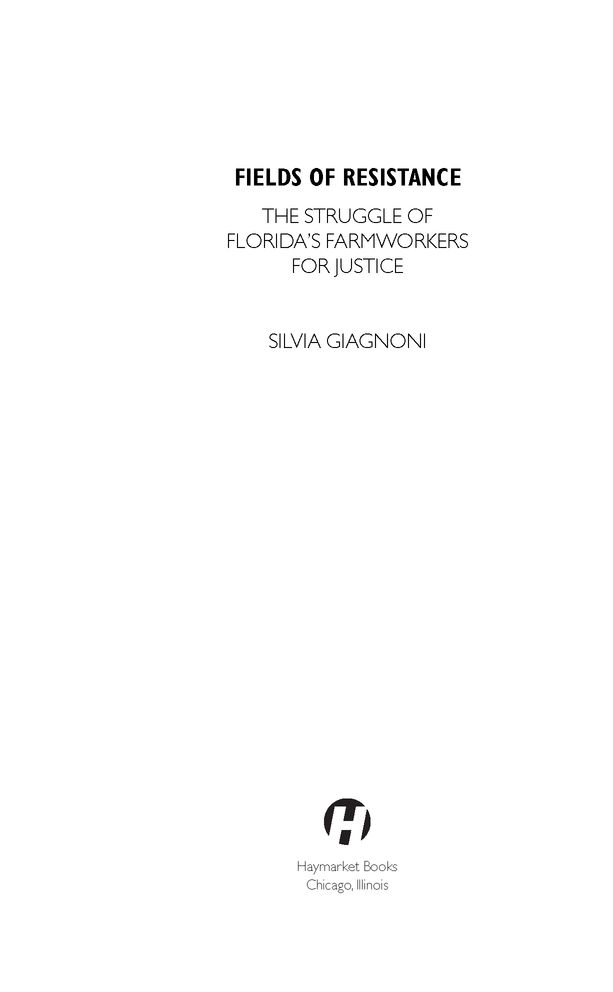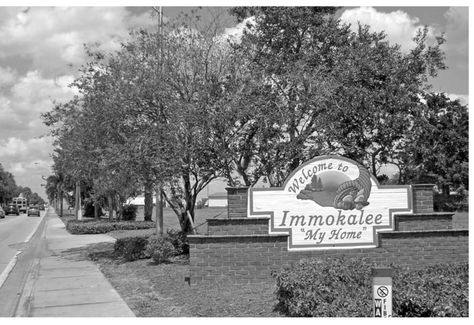Table of Contents
For the people of Immokalee,
and migrant communities everywhere
We write to taste life twice, in the moment, and in retrospection.
Anas Nin
We are all sovereigns. Its no longer the time of alms but of choices.
Letter to a Teacher, School of Barbiana
(my translation from Italian)
The migrants have no lobby. Only an enlightened, aroused and perhaps angered public opinion can do anything about the migrants. The[y]have the strength to harvest your fruit and vegetables. They do not have the strength to influence legislation. Maybe we do. Good night, and good luck.
Edward R. Murrow, Harvest of Shame
Sign welcoming visitors to Immokalee, Florida
INTRODUCTION
Invisible. In the office buildings at night, in the hotels during the early afternoon, or in the kitchens all day long: they are janitors, dishwashers, service workerslow-wage workers, many of whom are immigrants. Theyre hidden. As are the farmworkers, dispersed along infinite fields from dusk to dawn.
Invisible, so they can be more easily dehumanized.
Welcome to Immokalee My Home: so reads the sign marking the entrance to this far-removed community in Southwest Florida, home to many farmworkers. The words frame an idyllic sunset on a lake with a cornucopia of fruits and vegetables in the foreground to signify the abundance of the land. Immokalees position, in the middle of acres of cultivated fields, is what entices people from impoverished communities of Central America to come here. In Immokalee, there is work.
Fields of Resistance: The Struggle of Floridas Farmworkers for Justice chronicles a seven-month period (between November 2007 and May 2008), the length of the harvest in this part of the country, during which I regularly visited Immokalee and which coincided with crucial moments of the Coalition of Immokalee Workers Burger King Campaign. The book revolves around seasons as well as holidays and other celebrations of special significance to the community. The narrative unfolds as I meet and interview farmworkers and their families, activists, religious people, and social workers. The book provides a personal account of these encounters, the everyday life moments I shared with the people of Immokalee, but also attempts to provide historical and social background to better situate the events. This is, inevitably, a partial account. For this reason, it doesnt aim to be an all-encompassing work about Immokalee or the CIW, nor is it a book about immigration.
This work seeks to show the various cultural and social realities that coexist today in this part of Florida: the migrant community, the Seminole reservation, and Ave Maria town. The geographical proximity of these three realities, which, one might say, represent the present, past, and future of this part of Florida, is another aspect that renders Immokalee and its surroundings such a fascinating yet contradictory place.
Low-income Latino immigrants, who make up most of todays farmworking population, are all too often demonized in public discourses. Labels like illegal aliens or illegal immigrants have the effect of dehumanizing real people who might not have citizen rights yet, but surely deserve to be respected as human beings and recognized, if anything, for their economic contribution to the wealth of the nation. They are often mistreated and robbed, and, increasingly, victims of hate crimes and racial profiling.
In addition, even in the supposedly post-racial era of the Obama presidency, we as a society need to confront the issue of racism in the food chain. Who are the people who harvest, clean, and package our food? And moreover: do they have access to clean and healthy food? To raise these and other questions means to address issues of power.
While sentiments of compassion may lead to volunteering and charitable work, both of which are of great help in communities like the one in Immokalee, they are not enough. Many well-intended, goodhearted people are doing so much to make Immokalee a better place. Yet, without an understanding rooted in social criticismof why the immigrants are here; why they have been forced to migrate from their communities in Mexico, Haiti, Guatemala, and Honduras; why slavery still exists in America; why workers rights are human rights and why they should be improved if we are to create a just society; why corporate accountability is key; why the free market is not really free in the world of seed patents; why cheap is not really cheap given the high externalized cost of produce; why food cant be sustainable without being fairwe wont be able to create social change. This book does not purport to provide thorough answers to these questions or to analyze these issues exhaustively. However, it intends to invite reflection. Because it is upon places like Immokalee and the people who live and work there that the U.S. (and global) economy relies: places where human rights are routinely violated; places that remain invisible. Until we as a society realize and act upon this simple truth, there wont be real change.
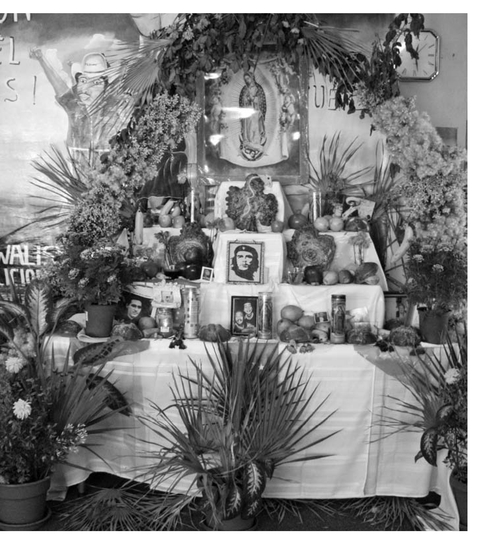
Altar at the CIW headquarters for El Da de los Muertos
One
EL DA DE LOS MUERTOS
Soup Kitchen
Its a sunny Friday morning when I arrive at the soup kitchen of the Guadalupe Center of Immokalee. Its November 2, el Da de los Muertos, a special day in Mexican culture. Tricia receives me with her incredible smile. She offers to give me a tour of the center before the first round of lunch begins.
Today its pretty slow, she sighs, pausing. Then she concedes: Well, its better this way. It means that there is work.
Following the harvest means living a life ruled by the seasons and the daily vagaries of climate and weathereven in the Sunshine State, where winters are usually mild and summers begin in April and die out in November.
Several crops are grown in the fields that surround the town of Immokalee: cucumbers, peppers, watermelons, squashes, potatoes, oranges and, more than anything else, tomatoes. During the winter months, farmworkers here handpick 90 percent of the tomatoes consumed in the entire country.
Tricia shows me the tables loaded with food: these are the daily donations of bread and pastries that come from the local supermarket, she explains.
Here at the soup kitchen we serve our clients, Tricia says with pride. Every day we have different groups of volunteers, primarily seniors, who have decided to dedicate their time to help those in need.
The Guadalupe Center serves soup at lunchtime every workday. For many of the farmworkers, this is the only warm meal they get to eat; quite often, there are no kitchens in the trailers where they live. The center generally feeds more than a hundred people a day, although sometimes up to four hundred are served, including many children who come when the schools are closed and their lunch services are not running. The most critical periods for the center (and the community) are during the coldest parts of winter and in midsummer when there are few volunteersmany flee the hot and humid South Florida weather. Whenever a freeze hits the crops, many are left without work. Some end up wandering the desolate streets of Immokalee with no food or shelter.


